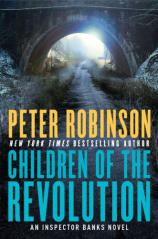Children of the Revolution: An Inspector Banks Novel
Review
Children of the Revolution: An Inspector Banks Novel
Peter Robinson’s mysteries, including his stand-alone works but particularly those comprising his wonderful Alan Banks series, do not depend on pyrotechnics to keep his legion of readers on both sides of the Atlantic coming back for more. His books are solidly built upon characters as opposed to thrilling events. Banks, a deceptively low-key but nonetheless dedicated and driven Detective Chief Inspector with the Eastvale Police Department, has a central, inherent mission: follow the evidence wherever it may lead and uncover the truth. This is particularly true in CHILDREN OF THE REVOLUTION, which by story’s end marks a turning point in the series.
The incident that begins and ultimately propels the book is the death of Gavin Miller, a former college professor who had been dismissed from his university post in disgrace some years previously. Miller, not exactly a popular social butterfly even in the best of times, had become semi-reclusive, using what little money he had to drink and brood when he was not sitting in his decrepit cottage and thinking in the rear-view mirror, so to speak, about life in the 1960s and ’70s, surrounded by music and posters of that era. The discovery of his body on a long-abandoned railroad underpass initially looks like a suicide by jumping or an accidental death by misadventure. Indeed, the unexplained presence of a large sum of money on his deceased person would seem to rule out third-party involvement.
"[I]t is the mystery at the heart of the book that ultimately propels the story and its central message concerning how the acts and omissions of the past can so often have an unintended and unexpected effect upon the present."
There is other evidence indicating that Miller was not alone when he died, and as a result, Banks and his team begin following a slender thread of circumstance into his recent and remote past. It seems that Miller was dismissed from his university position due to charges of sexual harassment, which, in retrospect, constituted a witch hunt as opposed to anything remotely supported by even insubstantial evidence. The issue is raised during Banks’s investigation as to whether or not Miller’s accusers actually framed him. As he investigates the events and the people involved in Miller’s dismissal, it appears that one or more of them might have had a decent motive for doing the man in. However, it is his remote past, including his days as a university student himself, that ultimately seems to provide greater potential for uncovering someone who might have had cause to do him harm.
When Banks’s queries lead him to someone in the upper echelons of the rich, famous and powerful, he is almost immediately warned off the target by his superiors. He, of course, can’t abide by this, and when the person in question seems to be lying to him --- a capital offense in his eyes --- it only causes him to dig his heels in more deeply and conduct what is basically an off-the-books investigation. Banks, his superiors’ orders notwithstanding, follows the evidence and, after several twists and turns, discovers the truth, which leads to a bit of ironic justice as well as a welcome turning point for Banks from both a personal and professional standpoint.
Much of CHILDREN OF THE REVOLUTION is given over to the cultural lore of the mid-20th century. The passages in which Banks and others of his age mention icons of that era to the bewilderment of the younger characters provide interesting vignettes throughout the novel. Still, it is the mystery at the heart of the book that ultimately propels the story and its central message concerning how the acts and omissions of the past can so often have an unintended and unexpected effect upon the present. As an added bonus, Banks’s choice of music as he sits, drinks and broods will have those of a certain age dusting off their music collections and unearthing tracks that might have been forgotten, but are not gone.
With CHILDREN OF THE REVOLUTION, Robinson once again brings his “A” game and some of his best writing to date.
Reviewed by Joe Hartlaub on March 28, 2014





